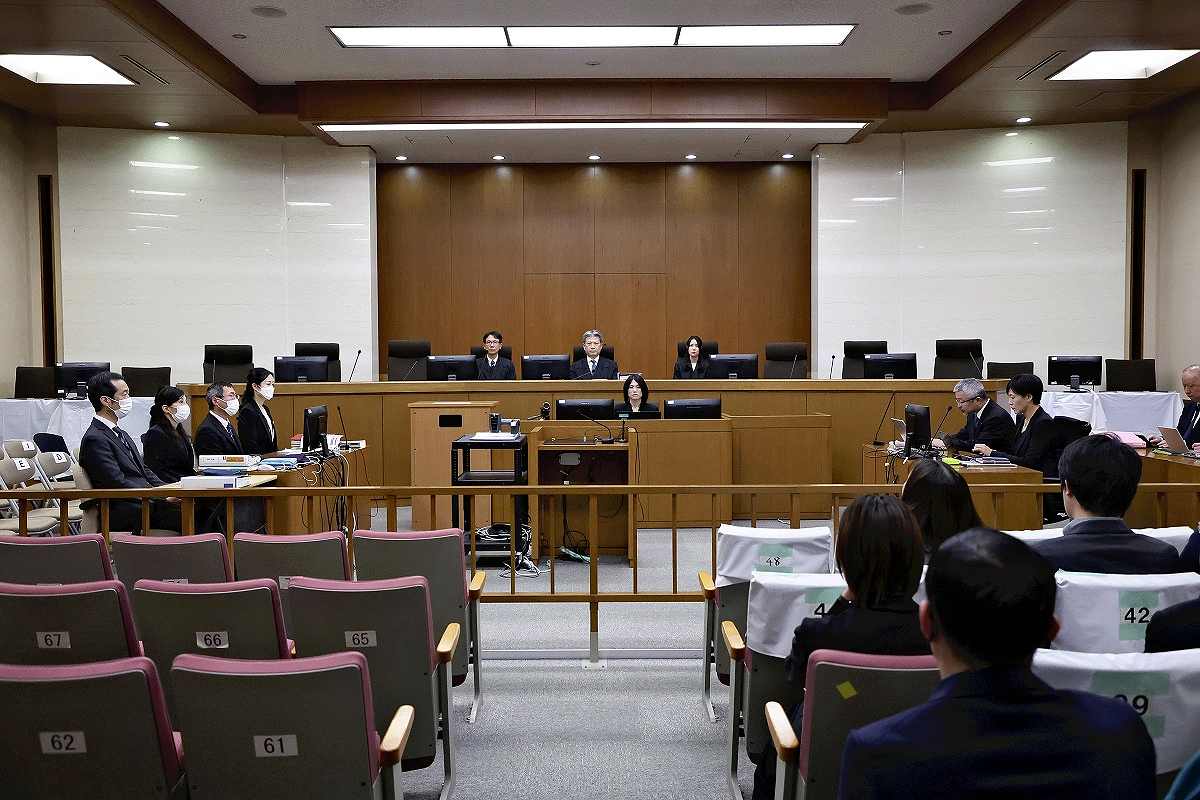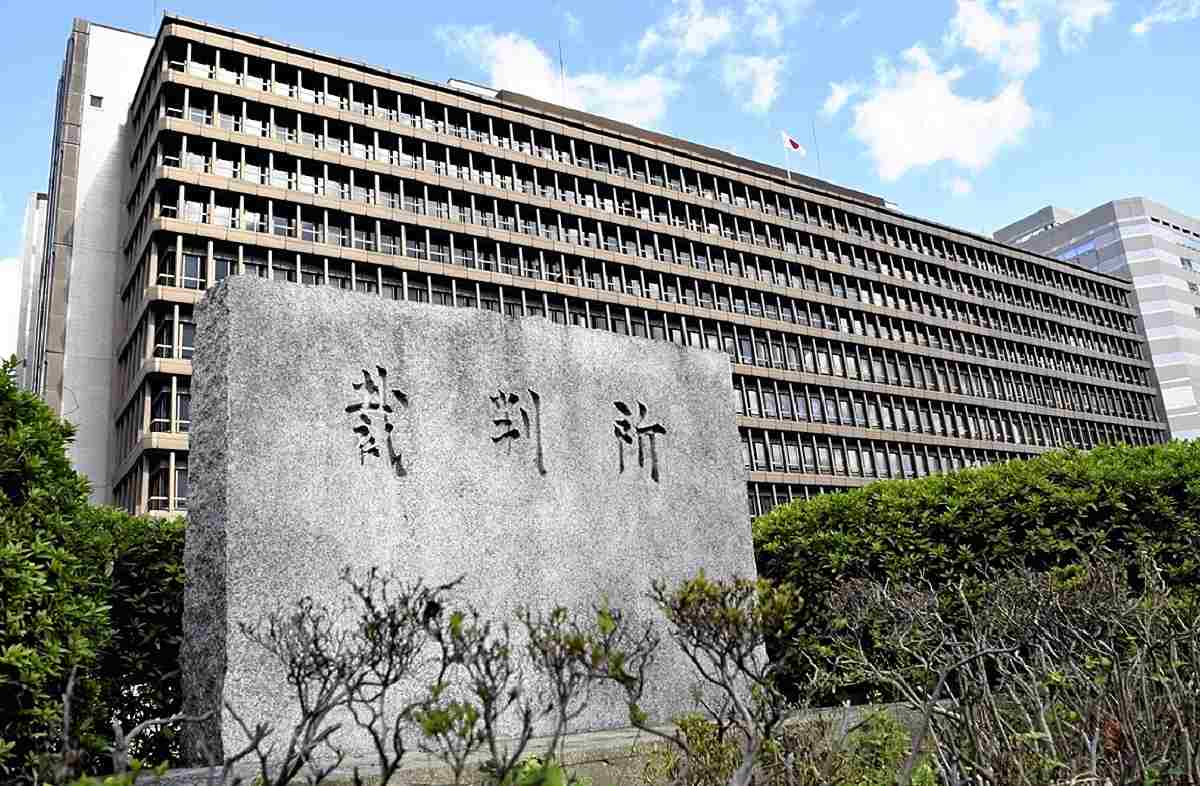Trial Reveals KyoAni Arsonist’s Sense of Social Isolation; Experts Question Wisdom of Keeping 53 Victims Anonymous

The Kyoto District Court room where the ruling in the case of the fatal arson attack on Kyoto Animation Co. studio was handed down on Thursday.
17:06 JST, January 26, 2024
Thursday’s court ruling in the case of the fatal arson attack on an anime studio in Kyoto noted that the defendant’s isolation from his surroundings could not be denied as a factor behind the incident.
An expert urged that extensive job assistance for socially isolated people would be necessary to deal with this kind of problem in the future.
The Kyoto District Court sentenced Shinji Aoba, 45, to death for killing 36 people in an arson attack on the studio operated by Kyoto Animation Co., also known as KyoAni, in July 2019.
Aoba’s background was revealed at the trial: His parents divorced when he was 9 and he grew up in an impoverished home while being physically and psychologically abused by his father. In adulthood, Aoba had trouble with his bosses at work, hopping between temporary jobs before becoming unemployed at age 30.
During questioning, the defendant said: “I have no friends and no ties at work. I eventually got tired of meeting people and stopped seeing them.”
Aoba then mentioned that his mass murder plan was influenced by a 2008 indiscriminate killing spree in Tokyo’s Akihabara district. He said of the man who committed that incident: “The lower people are in society, the less capacity they have. I couldn’t think of him as someone unlike me because I, too, had been unable to do anything right.”
There have been many incidents committed by social loners, such as the 2021 arson attack at a psychosomatic clinic in Osaka’s Kitashinchi district and indiscriminate attacks on passengers on the Keio and Odakyu train lines.
In 2023, the government enacted the Law on Promotion of Policy for Loneliness and Isolation, supporting private organizations working on such issues.
“Many men in their 20s to 40s feel lonely but have few support options available,” said Waseda University Prof. Mitsunori Ishida, an expert on countermeasures against loneliness and isolation. “Having a job that would connect them with society is important, and job assistance tailored to their individual circumstances must be provided.”
Anonymous trial
A total of 53 victims — 19 of the 36 who were murdered plus 34 of those who suffered injuries or other harm — were kept anonymous during the trial.
The district court did not reveal the reason for the anonymity, although it apparently was designed to protect the lives of the victims. However, scholars are concerned about excessive use of the practice.
The Criminal Procedure Law follows Article 82 of the Constitution, which states that trials shall be conducted publicly. However, a 2007 revision to the law allows anonymous hearings if the case is deemed to carry a “risk that the reputation or the peaceful social life of the victim or others will be seriously harmed.”
At Thursday’s trial, victims whose families apparently wished to remain anonymous were described as “Victims in Appendix 1, 2” and so on. The trial dealt in a mixture of real and other names, about which Aoba to said at one point, “I could’ve empathized with the victims more [if they were called by their real names].”
Even so, there was no incidence of major confusion, and one of the lay judges told reporters after the ruling, “There was no problem with anonymity because it did not cause any dispute about facts.”
Neither at the trial nor in media interviews did the district court explain why it chose to keep certain victims anonymous.
Last August, a group of criminal law scholars studying judicial information disclosure submitted a written request to the Kyoto district court calling for recognition of the importance of disclosing real names.
One group member, Ryukoku University research fellow Itaru Fukushima, said, “Giving consideration to the victims is important, but the principle of trials’ openness must not be undermined by an excessive spread of anonymity.”
Fukushima was concerned that anonymity would restrict access to court records, making it impossible to verify aspects of the trial after the fact.
“I want to know if anonymity really did not have effect on the trial,” he said. “The district court should explain the reasons for using anonymity.”
Top Articles in Society
-

Man Infected with Measles Reportedly Dined at Restaurant in Tokyo Station
-

Man Infected with Measles May Have Come in Contact with Many People in Tokyo, Went to Store, Restaurant Around When Symptoms Emerged
-

Woman with Measles Visited Hospital in Tokyo Multiple Times Before Being Diagnosed with Disease
-

Australian Woman Dies After Mishap on Ski Lift in Nagano Prefecture
-

Foreign Snowboarder in Serious Condition After Hanging in Midair from Chairlift in Nagano Prefecture
JN ACCESS RANKING
-

Japan PM Takaichi’s Cabinet Resigns en Masse
-

Japan Institute to Use Domestic Commercial Optical Lattice Clock to Set Japan Standard Time
-

Israeli Ambassador to Japan Speaks about Japan’s Role in the Reconstruction of Gaza
-

Man Infected with Measles Reportedly Dined at Restaurant in Tokyo Station
-

Videos Plagiarized, Reposted with False Subtitles Claiming ‘Ryukyu Belongs to China’; Anti-China False Information Also Posted in Japan























